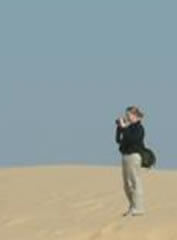
'The degree provided a good foundation in ecology, zoology, genetics, molecular ecology, and population biology which has been essential in my career.'
Tania Gilbert
Current role
I am a Conservation Biologist working for Marwell Wildlife, a conservation charity that owns and operates a zoological park in Hampshire.
Since graduating in 1997 I have worked for the Royal Botantic Gardens, Kew in Richmond on an aphid ecology project. I then volunteered on a biodiversity survey in Tanzania where I carried out small mammal, reptile and amphibian, bat, bird, ethnobotany and large mammal surveys.
On returning to the UK I did an MSc in Conservation Management, before taking up a post as an Assistant Conservation Officer at Surrey Wildlife Trust. At the Wildlife Trust, I developed GIS skills, carried out surveys, worked with databases, and wrote habitat management plans.
In 2001 I joined English Nature (now Natural England) as the Conservation Officer for Oxfordshire, where I was responsible for overseeing 79 SSSIs. In November of 2001, I left English Nature to join Marwell Wildlife as the Scientific Officer. Since that time my role has evolved and now incorporates conservation research, management of captive breeding programmes, reintroduction projects, project management and university lecturing.
In 2005 I began a part-time PhD alongside my job on a species of aridland antelope that is extinct in the wild (scimitar-horned oryx Oryx dammah). I graduated in June 2012. .
Outline the course you studied at the University of Birmingham and how it benefited you?
I enrolled on the BSc Biological Sciences degree at the University of Birmingham in 1994, and chose optional modules on ecology and zoology. I graduated with BSc (hons) Biological Sciences (Environmental Biology). The degree provided a good grounding in scientific methodology and discipline, which gave me the tools I need to carry out conservation research. It also provided a good foundation in ecology, zoology, genetics, molecular ecology, and population biology which has been essential in my career.
How did you find your first year in Birmingham?
My first year at Birmingham Uni initially challenged me academically, but was rewarding. On a more personal level, I had a fantastic social life, and made some lifelong friends, some of whom I still see regularly 18-years on.
How did going to University as a whole benefit you?
The whole experience of attending university in Birmingham was hugely beneficial. Aside from the formal teaching, I developed life-skills which are still useful today.
How did you find campus life?
I chose the University of Birmingham because it was a campus university, and I thought it would provide a greater feeling of ‘unity’ than a dispersed city centre university. I wasn’t disappointed. The general atmosphere in the halls in the vale, and throughout the university was fantastic. This continued when I moved out of halls in the second year into Selly Oak. The campus was convenient and always friendly.
How did you find living in Birmingham?
I thoroughly enjoyed my time at University, and for the most part enjoyed living in Birmingham, although I did feel the need to escape into the countryside regularly. That is probably a reflection on the fact that I am not really a ‘city’ person. The student community at the University was great.
Did you join any student societies during your studies?
I joined quite a few student societies during freshers week in the first year, but didn’t really ever attend any events. The exception to this was the Biology Society. My social life really grew out of my class-mates and friends I made in Halls.
Any tips to pass on to students thinking of coming here?
Enjoy it, socialise, work hard, and take every opportunity provided. It is a once in a lifetime experience, so don’t leave University with any regrets. It is challenging to find a balance between the social and work aspects of university, but if you manage it, you will reap the greatest benefits of your university career.
What are your aspirations for the future?
I am thoroughly enjoying my job, I get the opportunity to travel and meet some great people, and I have (and currently am) working on some ground-breaking conservation projects. My job can be unpredictable, it stretches my abilities, and I learn new things every day. My aspirations are simple. I would like to carry on with what I am doing.